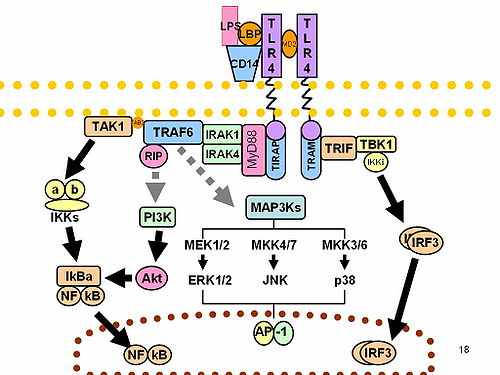Some minor information.
 Dendritic cell:- An antigen presenting cell is a very prominent cell now in our textbooks and especially when we deal with transplantation immunology. This was discovered by Ralph Steinman in 1973. He speculated that it could be important in the immune system and went on to test whether dendritic cells could activate T cells, a cell type that has a key role in adaptive immunity and develops an immunologic memory against many different substances.
Dendritic cell:- An antigen presenting cell is a very prominent cell now in our textbooks and especially when we deal with transplantation immunology. This was discovered by Ralph Steinman in 1973. He speculated that it could be important in the immune system and went on to test whether dendritic cells could activate T cells, a cell type that has a key role in adaptive immunity and develops an immunologic memory against many different substances.  Toll like receptors: Bruce Beutler was searching for a receptor that could bind the bacterial product, lipopolysaccharide (LPS), which can cause septic shock, a life threatening condition that involves overstimulation of the immune system. TLR were hence discovered. They are single, membrane-spanning, non-catalytic receptors that recognize structurally conserved molecules derived from microbes. They are more like pattern recognizing receptors. Three subgroups of TIR domains exist. Sub group 1 are receptors for interleukins, subgroup 2 directly to microbes, subgroup 3 to get signals from subgroup 1 and 2.
Toll like receptors: Bruce Beutler was searching for a receptor that could bind the bacterial product, lipopolysaccharide (LPS), which can cause septic shock, a life threatening condition that involves overstimulation of the immune system. TLR were hence discovered. They are single, membrane-spanning, non-catalytic receptors that recognize structurally conserved molecules derived from microbes. They are more like pattern recognizing receptors. Three subgroups of TIR domains exist. Sub group 1 are receptors for interleukins, subgroup 2 directly to microbes, subgroup 3 to get signals from subgroup 1 and 2.
image Source: Wikipedia.com

